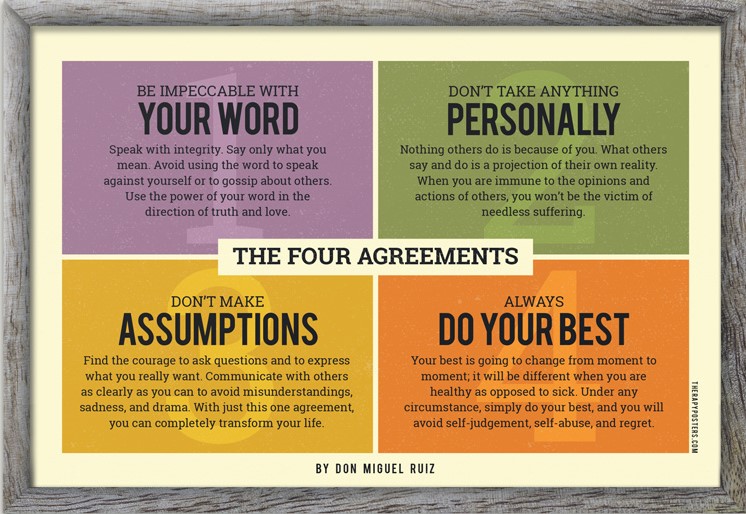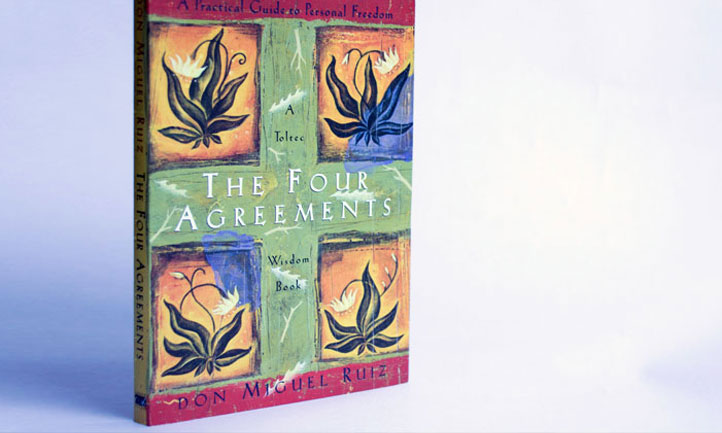Sometimes, the simplest ideas hold the deepest truths. The Four Agreements by Don Miguel Ruiz is one of those books that breaks down complex life challenges into four simple, actionable principles. It’s not tied to any religion or belief system but speaks universally to anyone looking for a more peaceful and intentional life. When I first read it, I was struck by how something so straightforward could be so transformative.
In this post, I’ll walk you through the core agreements and share how they’ve personally impacted me.
A Quick Overview: What Are the Four Agreements?
Ruiz introduces the idea that we live by a set of invisible agreements we’ve unconsciously made with ourselves, society, and others. Many of these agreements limit us, causing unnecessary suffering. He proposes four new agreements—simple, yet powerful—that can free us from self-imposed limitations and lead us to a more fulfilling life:
- Be Impeccable with Your Word
- Don’t Take Anything Personally
- Don’t Make Assumptions
- Always Do Your Best
Each agreement is easy to understand but surprisingly hard to practice consistently. Let’s dive into each one and explore why they matter.
1. Be Impeccable with Your Word
This is probably the most powerful agreement and also the hardest one to follow. Ruiz explains that our words are incredibly powerful—they can build or destroy, uplift or wound. Being impeccable with your word means speaking with integrity, honesty, and kindness, both to others and yourself.
Ruiz writes:
“Your word is the power that you have to create. It is a force; it is the power you have to express and communicate, to think, and thereby to create the events in your life.”
This resonated deeply with me. I started noticing how often I use words carelessly—whether it’s self-criticism or gossip. For instance, how often do we say, “I’m so stupid” when we make a mistake? Those words, even said jokingly, create negative energy. After reading this, I made a conscious effort to speak more positively, not just to others but to myself. It wasn’t easy, but over time, I noticed a shift in my mindset and relationships.
2. Don’t Take Anything Personally
This agreement is a game-changer, especially if you’re someone who, like me, tends to overthink what others say or do. Ruiz explains that nothing others do is because of you—it’s a reflection of their own reality, experiences, and beliefs. When we take things personally, we make ourselves the center of someone else’s world, which leads to unnecessary pain.
He puts it perfectly:
“Nothing others do is because of you. What others say and do is a projection of their own reality, their own dream.”
I remember a time when a friend snapped at me out of the blue. Normally, I’d spend hours wondering what I did wrong. But applying this agreement helped me realize it wasn’t about me—it was about whatever they were going through. This shift in perspective saved me from a lot of emotional turmoil and helped me respond with empathy instead of defensiveness.
3. Don’t Make Assumptions
How often do we assume things without asking for clarity? We assume someone is upset with us, assume what others think, or assume outcomes based on incomplete information. Ruiz argues that these assumptions create misunderstandings and unnecessary suffering.
He advises:
“Find the courage to ask questions and to express what you really want. Communicate with others as clearly as you can to avoid misunderstandings, sadness, and drama.”
I’ve caught myself making assumptions in both personal and professional settings. For example, if a colleague didn’t respond to my email right away, I’d assume they were annoyed or dismissive. In reality, they were just busy. After reading this, I started asking more questions and clarifying situations rather than jumping to conclusions. It made my interactions smoother and reduced a lot of unnecessary stress.
4. Always Do Your Best
The final agreement ties everything together. Ruiz reminds us that “doing your best” doesn’t mean perfection—it means doing the best you can in any given moment, considering your circumstances. Some days, your best might be exceptional; other days, it might just be getting through the day. The key is to give what you can without self-judgment or regret.
“Under any circumstance, simply do your best, and you will avoid self-judgment, self-abuse, and regret.”
This agreement has been a lifesaver for me, especially on days when I feel overwhelmed. Instead of beating myself up for not achieving everything on my to-do list, I remind myself that my best is enough. It’s a compassionate way to live, and it’s helped me find more balance and peace.
Real-Life Application: Small Changes, Big Impact -The Four Agreements
After reading The Four Agreements, I didn’t just shelve the book and move on. I started applying these principles in everyday life. Here’s how:
- In Conversations: I became more mindful of my words, choosing to uplift rather than criticize.
- In Relationships: I stopped taking things personally and saw how much lighter I felt.
- At Work: I asked more questions instead of assuming, which improved team dynamics.
- In Self-Care: I let go of perfectionism and focused on doing my best each day.
These small shifts made a big difference. I found myself calmer, more grounded, and more in control of my reactions.

Final Thoughts – The Four Agreements
The Four Agreements is a book that feels like a guide to living with integrity, clarity, and peace. It’s not about adopting a new belief system—it’s about unlearning the limiting agreements we’ve inherited and replacing them with empowering ones.
If you’re looking for a book that offers practical, actionable wisdom to improve your life, this is it. It’s a reminder that profound change starts with small, conscious choices in how we think, speak, and act.
Have you read The Four Agreements? Which agreement resonated with you the most? If you haven’t read it yet, I encourage you to give it a try. It’s one of those books that stays with you and changes the way you see the world—and yourself.

